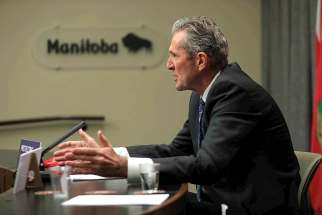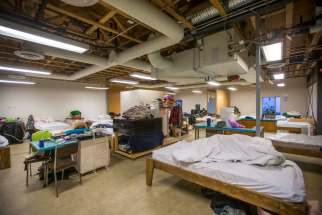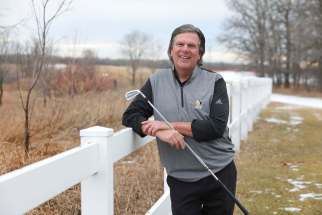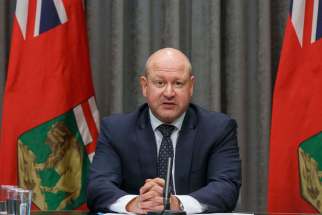Pallister’s per capita vaccine claims falter in national spotlight
Read this article for free:
or
Already have an account? Log in here »
To continue reading, please subscribe:
Monthly Digital Subscription
$19 $0 for the first 4 weeks*
- Enjoy unlimited reading on winnipegfreepress.com
- Read the E-Edition, our digital replica newspaper
- Access News Break, our award-winning app
- Play interactive puzzles
*No charge for 4 weeks then billed as $19 every four weeks (new subscribers and qualified returning subscribers only). Cancel anytime.
Read unlimited articles for free today:
or
Already have an account? Log in here »
Hey there, time traveller!
This article was published 08/12/2020 (1437 days ago), so information in it may no longer be current.
True or false?
For nearly a week, Premier Brian Pallister has been howling about how Ottawa was crippling Manitoba’s COVID-19 vaccination program by withholding a portion of its share for First Nations people.
As the province with the highest proportion of Indigenous peoples, Pallister claimed the move could unfairly delay delivery of the vaccine to non-Indigenous Manitobans.
On Tuesday, he announced, in response to his concerns, Ottawa had agreed to give Manitoba a 15 per cent increase over and above its per capita share to ensure non-Indigenous Manitobans were not treated unfairly.
That’s quite a win for Pallister if — and this is a very big if — the story is true.
From the moment he first made allegations about Ottawa “holding back” some of Manitoba’s vaccine allotment, there were problems of fact and logic.
Nobody from the federal government would confirm such a move had been threatened or that Ottawa agreed to give Manitoba more than its per capita share of vaccine. The only thing keeping Pallister’s narrative alive was, quite frankly, the reluctance of the feds to answer questions about his bizarre claims.
“But, at the end of the day, I think it all evens out and I think we’re all agreed that we’re going with a per capita allocation.” – Dr. Howard Njoo, Canada’s deputy chief public health officer
That reluctance came to an end Wednesday.
Dr. Howard Njoo, Canada’s deputy chief public health officer, told a technical briefing the nation’s supply of vaccine will be distributed solely on a per capita basis — no exceptions.
He acknowledged several provinces raised concerns about demographic and geographic variables (number of people in long-term care, higher average age) that could affect their ability to distribute the vaccine to people outside of the priority groups.
“It’s for certain that we’ve had active discussions (with provinces),” Njoo said. “People could quibble and say, ‘If I look at the census data, I’ve got more seniors or older people in my province or a greater number of health-care workers.’
“But, at the end of the day, I think it all evens out and I think we’re all agreed that we’re going with a per capita allocation.”
Njoo’s comments raised significant concerns, but the premier’s office would not stray from the original story.
“Following repeated queries from the province, federal officials from Health Canada, (Public Health Agency of Canada) and Intergovernmental Affairs confirmed to Manitoba officials on Monday evening we were receiving more than our per capita share,” a spokeswoman for the premier said in an email statement.
“That number was 9,600 for the Moderna vaccine. We stand by what information and facts have been provided to us.”
Mentioning the Moderna Inc.-produced vaccine adds a new layer of complexity to a messy tale.
Despite the fact Indigenous communities were identified as one of four priority groups for vaccination, Njoo said federal, provincial and territorial officials all agree the Pfizer Inc. vaccine — which must be shipped and stored at ultra-cold temperatures — cannot be safely distributed to smaller, northern or remote regions.
The Moderna vaccine, which does not have the same temperature requirements, will ultimately be a better fit for Indigenous communities, but because less is available now, there will be a delay in getting vaccine to them.
That raises concerns about what the Manitoba premier had hoped to accomplish with allegations that appear, on closer inspection, to be factually tenuous.
If you pay close attention to Njoo’s comments, you get this:
The Pfizer vaccine, which is the only vaccine currently approved for use in Canada and will dominate early deployment, will be focused on communities that can support its unique shipment and storage requirements. Subsequent shipments of Moderna doses will be focused on rural, northern and remote communities.
Dissect this information all you want and you still come out with one inescapable fact: no province is getting more than its fair per capita share, although the specific amounts of the different vaccines will likely change as they become available.
That raises concerns about what the Manitoba premier had hoped to accomplish with allegations that appear, on closer inspection, to be factually tenuous.
Suggesting Indigenous people might push non-Indigenous people to the “back of the line,” as Pallister put it last week, will no doubt play well with the Tory base.
It’s certainly not the first time Pallister has lashed out at Indigenous people to solidify his Tory credentials. With political fundraising at all-time low levels, Pallister might be able to justify his rant solely as a tactic to get core supporters to reach for their chequebooks.
It should be noted the federal government is not blameless.
Hounded by the opposition to reveal more of its vaccine plan, Liberal officials have been circumspect about many fine details and Ottawa has still not responded directly to Pallister’s allegations.
As always, big losers in all this political hyperbole are Manitobans, who have been unfairly riled up about something that isn’t really much of an issue at all.
Indigenous Manitobans have been left feeling unfairly persecuted for completely justifiable priority access to a vaccine; non-Indigenous citizens have been encouraged, inappropriately and without cause, to resent those who might get earlier access.
No matter how you feel about who should get the vaccine first, pitting citizens against each other isn’t the job of any premier.
dan.lett@freepress.mb.ca

Dan Lett
Columnist
Born and raised in and around Toronto, Dan Lett came to Winnipeg in 1986, less than a year out of journalism school with a lifelong dream to be a newspaper reporter.
Our newsroom depends on a growing audience of readers to power our journalism. If you are not a paid reader, please consider becoming a subscriber.
Our newsroom depends on its audience of readers to power our journalism. Thank you for your support.








